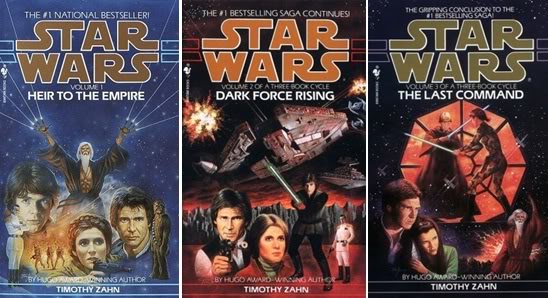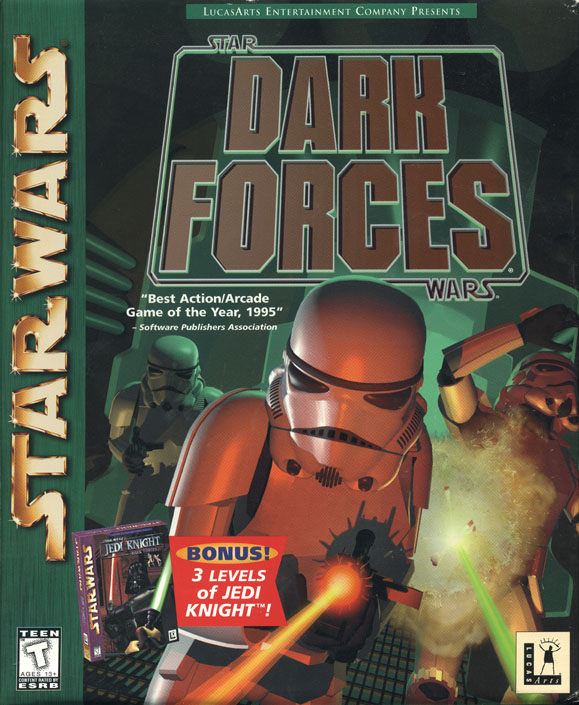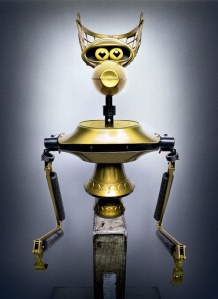I’m late to it (the story of this site) but did want to make some sort of comment about the announcement by Lucasfilm last week regarding what has come to be known as the Expanded Universe.
There have been lots of questions in the last year or so about what would or would not be considered “canon” as production on Episode VII gets closer and closer. In fact a few months ago there was the news that Lucasfilm had convened some sort of committee to decide what would make the cut. And now we know the answer: Canon in the Star Wars Universe will only include the six feature films and the TV show The Clone Wars.
That means all the books, comics, games and other material that has come before should not be counted when discussing the core Star Wars story. Instead it will be labeled as “Legacy” while at the same time there are a new batch of books being planned that *will* be part of Star Wars canon, beginning four books starting later this year. Lucasfilm said, though, that while those stories aren’t officially part of the universe they may cherry pick certain elements for future stories. So while the new stories may introduce a character like Mara Jade the talent involved in telling those stories is under no obligation to adhere to what was established about her in the books and comics starring her.

On the one hand this makes sense. Disney is obviously interested in telling more stories in the Star Wars universe, whether on film or in print or wherever and those folks want to take the occasion of a new movie coming out to reboot things in a sense, building out a new universe of original stories that’s more under their control. I get that and can’t fault the logic. I enjoy cohesive universe stories and would be the first one to admit that the EU sometimes was confusingly messy and inconsistent. This writer would portray Han in one way, another in a very different way. One writer would have the universe in shambles and falling apart, another would portray one that’s in the midst of a golden age. It was…yeah, messy is the best word.
But at the same time it’s hard to think of all these stories now being relegated to, if not the junk drawer at least the shelf above the stove that’s hard to reach and you don’t need anything from up there regularly. That’s because, way before even rumors of a prequel trilogy started circulating, those were the only way for fans to get more of a Star Wars fix.
It’s hard to over-estimate how big an event, particularly in retrospect, the release of Heir to the Empire, the first book in what came to be known as The Thrawn Trilogy from writer Timothy Zahn, was exactly. Here was a new Star Wars book at a time when the franchise seemed to be falling into the background of popular culture. There weren’t LEGO sets, there weren’t action figures. There was nothing. This was a drink of water in the desert for fans. It was huge. And that trilogy of novels were what gave things a jolt and began to bring it back to being the cultural juggernaut it is now.
Think about it: Without Heir kicking things off in 1991 – something that must have seemed like a huge risk to the publisher since there was so little happening on the Star Wars front at the time – it’s hard to imagine the Original Trilogy coming back to the forefront. Without something that proved out the continued interest in Star Wars it’s likely we would never have gotten the 1995 VHS remasters (a special moment for me as it was the first time I’d seen the movies in widescreen format since watching them on the big screen during their original theatrical release) or the new line of action figures that represented one of the first big forays into the toy aisle in *years.* And without the 1995 VHS remasters it’s hard to imagine the 1997 Special Editions (whatever you think of them) and without the 1997 Special Editions you don’t get the Prequel Trilogy (whatever you think of it). And without the Prequel Trilogy you don’t get to where we are now. In between that, Heir to the Empire and the rest of the books proved there were fans out there ready for Star Wars video games (I loved games like Dark Forces, X-Wing, Rebel Assault and others) and other material.

So it’s hard to admit, as a fan who loved many of the stories from the Expanded Universe – and who spent countless hours in high school and college debating how those stories fit into the Original Trilogy and didn’t contradict a thing, dammit – that they are no longer official. We all, if I’m being honest, kind of knew that even if many of us at some point considered the Thrawn Trilogy to be Episodes VII, VIII and IX whether Lucas was willing to say that out loud or not.
That being said, here’s to more Star Wars. There will be a whole generation of fans who come to know the universe primarily through these new movies that are coming out over the next several years and whose first book, read to bide the time between theatrical releases they already know are coming, will be one of these new ones that are created to be official parts of the story. No, it won’t be as messy and chaotic as the Expanded Universe fans like myself have been following since 1991. But it will be theirs. And that’s what’s important.
Like this:
Like Loading...
 On many levels I’m appreciating this oral history of the legendary Mystery Science Theater 3000 just as a fan of the show. While I wasn’t involved in those usenet groups, wasn’t actively involved in trading tapes with others through the mail or anything like that I did love the show, identifying immediately with the humor on it and absolutely aware that what I was watching was incredibly unique. I had dozens of VHS tapes with episodes recorded off of Comedy Central (and later Sci-Fi) that I would watch over and over again, always on the lookout for new episodes to add to my collection.
On many levels I’m appreciating this oral history of the legendary Mystery Science Theater 3000 just as a fan of the show. While I wasn’t involved in those usenet groups, wasn’t actively involved in trading tapes with others through the mail or anything like that I did love the show, identifying immediately with the humor on it and absolutely aware that what I was watching was incredibly unique. I had dozens of VHS tapes with episodes recorded off of Comedy Central (and later Sci-Fi) that I would watch over and over again, always on the lookout for new episodes to add to my collection.


